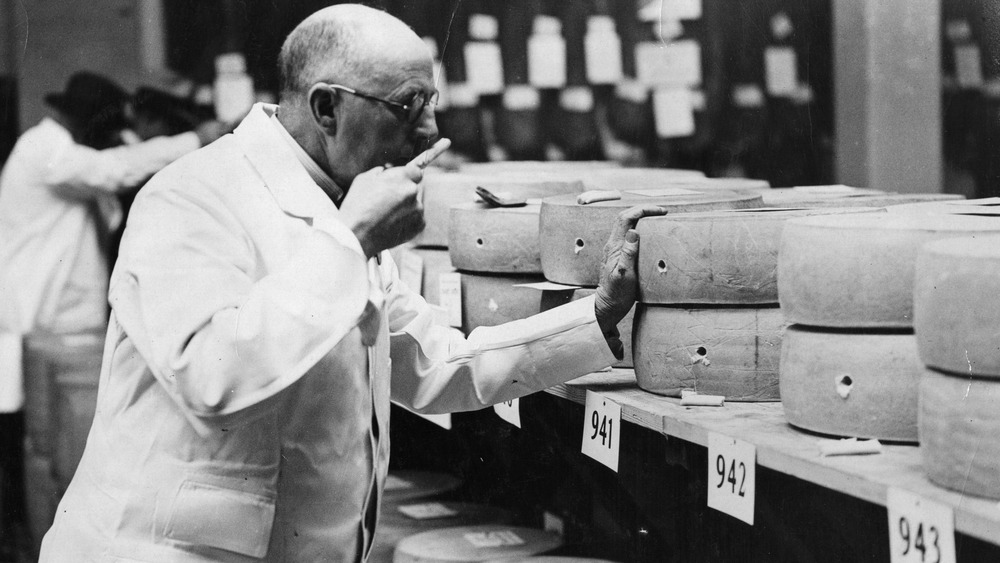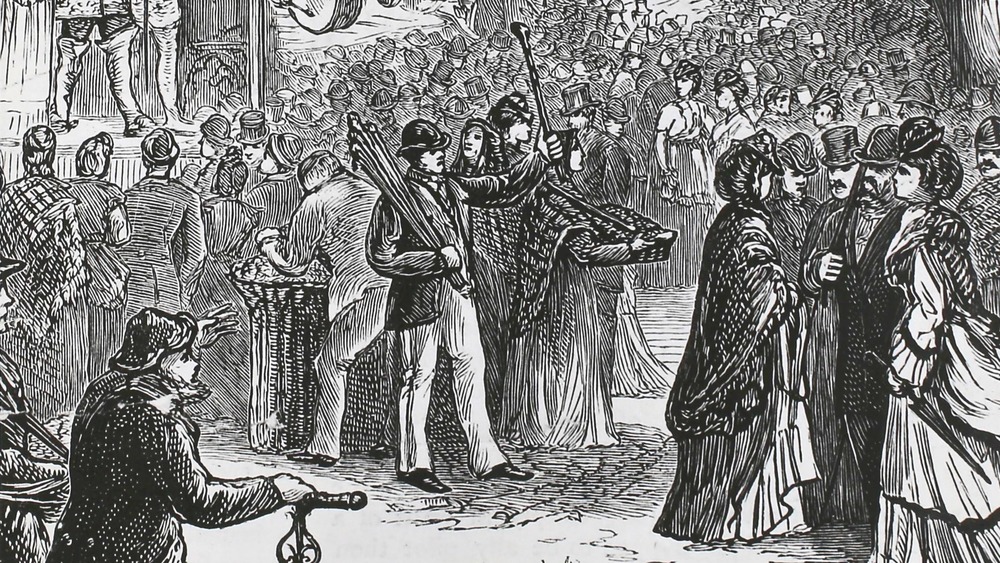The True Story Of The Great Cheese Riot
What would you do for what you love? How about for what you love to eat? Would you, by any chance, start a riot that lasts for several days and kills at least one person?
So you might not. But in October 1766, citizens of Lincolnshire and Nottingham, England, did that very thing in what is now called the Great Cheese Riot.
The year 1766 was a terrible year for farming. All across Europe, crops failed, so prices of wheat, flour, corn, and other food products rose astronomically, explained Amusing Planet. Failing crops fueled fears of a food shortage. These fears were further inflamed when businessmen began exporting their products outside of the United Kingdom to take advantage of the high prices elsewhere. Because, you know, capitalism.
It all came to a head during the Nottingham Goose Fair. The fair has been a staple of the community for centuries, and according to the Visit Nottingham website, it's still held to this day (except for 2020 — canceled because of the pandemic). Though the festival celebrated livestock, by the 18th century, it was mostly focused on cheese. Vendors sold cheese by the ton during the fair, wrote Notts TV. The fair attracted residents of not just Nottinghamshire but also nearby Lincolnshire, Cambridgeshire, and Norfolk.
The Nottingham Goose Fair of 1766, though, turned violent. Despite the ongoing shortage and high food prices, that year saw an unusual volume of cheese available for sale. All sold for more than double their average cost. Understandably, the locals were less than pleased.
Large wheels of cheese rolled down streets
At first, it was just grumbling from some locals, but soon, everything blew up. Sometime around evening, traders from Lincolnshire began buying up hundreds of pounds of cheese to sell in their neighborhoods. As they started to take their purchases and leave, a group of "rude lads" blocked their way. The boys asked the men to share their spoils with Nottinghamshire instead. They refused.
Violence broke out. The two factions started to fight, and other residents took notice. A mob grew and began looting all the stalls in the fair. People broke shop windows and grabbed wheels of cheese. No one was being subtle. John Frost Sutton's The Date Book of Remarkable and Memorable Events Connected to Nottingham recounted cheese being rolled down "Wheeler-gate and Peck-lane in abundance." If you've ever seen that sport where people run down a hill chasing a wheel of cheese (National Geographic, on YouTube), you know cheese is exceptionally hardy. The mayor of Nottingham tried to calm everyone but ... he was knocked down a wheel of cheese.
Nottingham residents, not at all worried about their injured mayor, set up roadblocks to stop merchants from carrying away their cheese. The mob boarded a boat and seized the cheese cargo. They attacked a warehouse, and the owner pulled together an armed militia to defend his cheese. The local magistrate refused to allow people to search homes for stolen cheddar.
Despite this, several people were arrested, which only angered more people.
The military had to step in
The next day, the 15th Dragoons, a unit of the British army, was called in. It was a bad idea. After a clash, the soldiers fired into the crowd, and a man was killed. He was a farmer and was trying to protect his produce, but he was mistaken for a looter.
Rioting now spread to other nearby cities, everyone angry that they couldn't access their cheese. More warehouses were burned and looted. The unrest continued for days. Eventually, the military restored order, and the riots ended. For a few years after the riot, an armed guard accompanied any cargo filled with cheese just in case someone decided to restart the violence.
Today, the people of Nottingham commemorate the Great Cheese Riot of 1766 by retracing the journey of the wheels of cheese. Although cheese remains a big part of their diet, the Nottingham Goose Fair is more like a county fair these days, with rides and attractions. Not a lot of large wheels of cheese anymore. And well, there's far more cheese variety in a local grocery store now.
So while people rioted more because of food shortages than their love of cheese, it's still a testament to how vital the food product is to Nottingham. And it could be worse. You could be rioting over which actor plays Macbeth the best. (Oh, wait. That already happened.)


